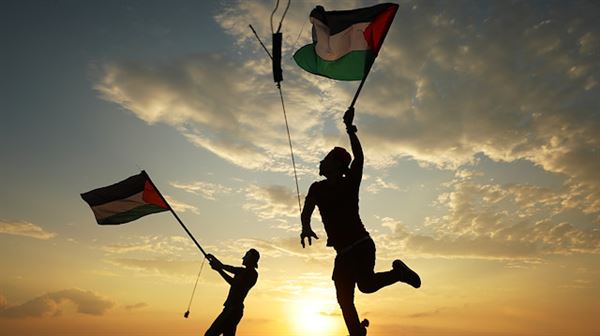More than 40 years have passed since the International Day of Solidarity with the Palestinian people was instituted by the UN in 1977. The day, marked
More than 40 years have passed since the International Day of Solidarity with the Palestinian people was instituted by the UN in 1977.
The day, marked every year by Palestinians and internationally, falls on the same day of Nov. 29 that the UN General Assembly adopted in 1947 Resolution 181, the UN Partition Plan for Palestine.
Ever since, after 72 years, the dream of an independent Palestinian state has not seen the light of day amid symbolic international solidarity that has failed to give the Palestinian people their rights, while Israel occupies most of the land of historical Palestine.
The UN resolution called for the partition of Palestine into three territories, including Jewish and Arab states, following the end of the British Mandate period of 1923-1948.
The first is an Arab state on an area of about 11136.95 square kilometers (4,300 square miles), located on the western Galilee area in Acre city of the West Bank, and the southern coast extending from Ashdod city to Rafah, with a part of the desert along the border with Egypt.
The second is a Jewish state on an area of 14762.93 square km (5,700 square miles), located on the coastal plain from Haifa to the south of Tel Aviv and the eastern Galilee, including the Lake Tiberias, Galilee Panhandle, and Negev desert.
The third area of Jerusalem and Bethlehem and their neighboring lands were designated as the UN trust territories.
Although Jewish people formed, at the time, 33% of the total population and owned only 7% of the land, the resolution gave them a state on 56.5% of the total area of historical Palestine.
Arabs who owned the majority of the land with 67% of the population were only designated 43.5% of the land, and Arab countries rejected the resolution completely.
The resolution was not implemented as the Jewish armed groups took control of most of the territory of Palestine in 1948.
In the same year, Britain withdrew from Palestine, and the armed Zionist organizations seized Palestinian lands on which they established the state of Israel.
Three quarters of Palestine came under Israeli control, Jordan ruled the West Bank, and the Gaza Strip came under Egyptian authority.
In the 1967 Arab-Israeli War, Israel occupied the West Bank, including East Jerusalem, the Gaza Strip with the Sinai Peninsula and the Syrian Golan Heights.
Following the war, the UN Security Council adopted Resolution 242 which calls for an Israeli withdrawal from all territories occupied during the conflict.
After Oslo I Accord was inked between Israel and Palestine in 1993, some areas in the Palestinian territories were subject to autonomy under the control of the Palestinian National Authority.
At its 67th meeting on Nov. 29, 2012, the UN General Assembly voted in favor of a resolution granting Palestine the status of a non-member observer state at the UN.
With the collapse of political negotiations with Israel in late 2014, the Palestinians turned to the international community, demanding recognition of the Palestinian state on the 1967 borders.
On Dec. 31, 2014, Washington vetoed an Arab draft resolution to end the Israeli occupation of the Palestinian territories by the end of 2017.
Palestine became a member of the International Criminal Court On April 1, 2015, and the Palestinian flag was raised for the first time at the UN On Sept. 30, 2015.
On Nov. 23, 2015, the majority of the UN General Assembly member states called on Israel to end its occupation of the Palestinian territories, stressing the need for a comprehensive solution of the issue.
The UN General Assembly on Dec. 19, 2017 passed a resolution reaffirming Palestinians’ right to self-determination — a resolution that garnered support from 176 countries, and objection from seven states, including Israel and the U.S.
Israel today occupies some 85% of historical Palestine.
Although the state of Palestine is now formally recognized by 136 countries worldwide, it enjoys neither true independence nor sovereignty.
While roughly 80% of the world now officially recognizes Palestine, many countries — including the U.S., Britain and France — do not.
The Palestinian people, estimated at 13 million, now live primarily in the Palestinian territories occupied by Israel since 1967, including East Jerusalem, Israel, neighboring Arab countries, and in refugee camps across the Near East.
